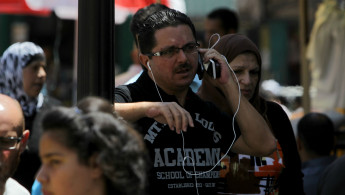3G phone service set for great reception among Palestinians
An agreement signed on November 2016 finally removed the last Israeli hurdle that was holding up the release of 3G equipment that had been laying in Israeli warehouses for years.
To get an idea of how long this breakthrough has been in the works, one has to go back to March 2013 when former US president Barak Obama visited Ramallah. At that time Palestinian activists erected three huge billboards that read "Don't bring your smart phone with you when you come to Ramallah, we have no 3G in Palestine."
Following the 1993 Oslo Accords establishing the Palestinian Authority (PA), Israeli and Palestinian negotiators agreed to share the electromagnetic spectrum, which includes frequencies for television, radio and mobile services.
A joint technical committee (JTC) was created to discuss the requirements of each side. According to the accords, the Palestinians were to present their spectrum needs, and the JTC would deliver them within one month. In practice, however, the forum has achieved little.
Israel accuses Palestinians of undermining the committee by directly registering its broadcast frequencies with the International Telecommunications Union (ITU), while Palestinian officials counter that they had no other choice because of delaying tactics by the Israelis.
The continuous delays led Palestinian officials to conclude that Israel regards their access to technology as hinging on a final peace deal.
 |
The continuous delays led Palestinian officials to conclude that Israel regards their access to technology as hinging on a final peace deal |  |
In the meantime, Palestinian officials say Israel has used the years since Oslo without progress in peace talks to cement its control over the airwaves. Government and business leaders complain that Israel is propping up its telecom sector at the expense of Palestinian providers by refusing to release more frequencies, as Israeli telephone and 3G services are available throughout the West Bank. Israel says this is merely unintentional spillover.
While the Israeli government was delaying the granting of import licenses for 3G equipment, Israeli mobile companies were allowed a free hand to set up their cell phone transmitters in Jewish settlements that are spread throughout the occupied territories. Palestinians who wanted 3G were forced to buy the Israeli mobile services.
Amar Al-Aker, the CEO of the largest Palestinian mobile company Jawwal, told a technology Expotech 2017 conference that Palestinians have increased their use of Israeli mobile services.
He said that the number of Palestinian subscribers to the Israeli companies has spiked from 150,000 in 2015 to 370,000 in 2016. He estimated that the loss of revenue to his company is $100 million a year.
 |
Israeli mobile companies were allowed a free hand to set up their cell phone transmitters in Jewish settlements that are spread throughout the occupied territories |  |
A campaign to boycott Israeli cell companies was adopted by the Palestinian government and local merchants were prevented from selling Israeli SIM cards. On 6 April, Palestinian attorney general issued a warning to local stores against selling Israeli SIM cards.
While the Palestinian government was busy rooting out Palestinian use of Israeli phone services, a group of Palestinians announced a campaign against the two Palestinian cell companies. Entitled the "Coalition of civilised demand for a fair telecommunications sector", the campaign wants users to lessen their use of the Palestinian mobile services until the companies lower their rates.
At present, prices for Palestinian cell phones are much higher than those in Israel or nearby Jordan. The campaign has called on Palestinians to stop using their cell phones for one day - April 22 - in protest against the high prices.
The World Bank has estimated that since 2013 the Palestinian market has lost an estimated one billion dollars. The report issued on 1 April cited the competitive disadvantage that Israeli companies with 3G and 4G create for the Palestinian market.
Daoud Kuttab is an award-winning Palestinian journalist and former Ferris Professor of Journalism at Princeton University.
Follow him on Twitter: @daoudkuttab
Opinions expressed in this article remain those of the author and do not necessarily represent those of The New Arab, its editorial board or staff.



